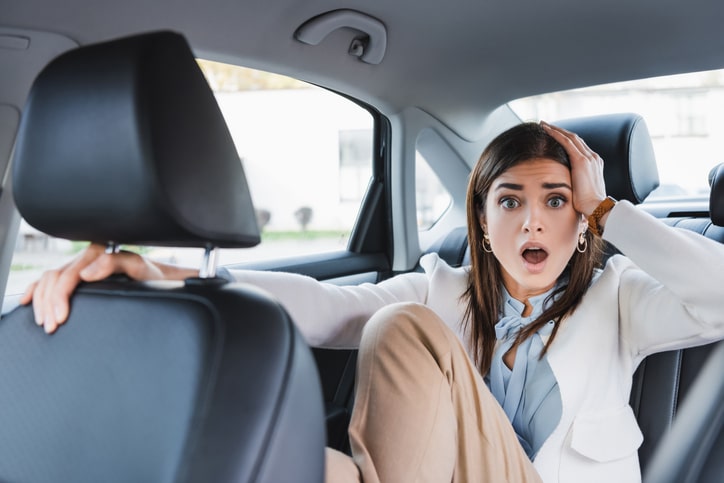September 23, 2024 | Car Accidents
Ridesharing is a popular form of transportation in Oklahoma City. However, as with any type of travel, it carries some risks. Accidents happen—and ridesharing collisions can be more complicated for victims. Whether you were involved in a crash with an Uber or a Lyft, it is imperative that you know how to protect your rights and your interests. Here, our Oklahoma City car crash lawyer explains what makes rideshare collisions different.

The Key Thing that Makes Ridesharing Accidents Different: Insurance
There are actually a lot of similarities between ridesharing accident claims and other car accident claims. Oklahoma’s fault-based liability standard, its modified comparative negligence law, and the two-year personal injury statute of limitations all still apply. However, there is one significant (important) difference in these cases: Insurance coverage. Ridesharing accidents present complex insurance issues because they almost invariably involve multiple, often overlapping, insurance policies. Determining which policy is applicable is key to effectively navigating a claim.
Notably, our state has a specialized law in place that governs ridesharing insurance coverage. Under Oklahoma House Bill 1614 (HB 1614), ridesharing companies—Uber, Lyft, etc—must comply with specific insurance requirements. Indeed, the law mandates that rideshare drivers must carry a higher minimum level of insurance coverage than typical drivers when they are logged into the app and actively providing a ride.
Understanding the Three Main Insurance Scenarios (Ridesharing Collision)
Ridesharing drivers in Oklahoma must always carry at least two insurance policies. If they work for Uber or Lyft, they likely have three different insurance policies: A) Their personal auto insurance coverage, B) A contingent policy, and C) A commercial policy that meets Oklahoma’s ridesharing standard. Here is an overview of the three most common insurance scenarios for Uber/Lyft crashes in Oklahoma:
- Ridesharing App Turned Off: When the ridesharing app is turned off, the driver’s personal automobile insurance is the only coverage in effect. In this scenario, any accident that occurs falls under the driver’s personal insurance policy, just like any other private driving incident. For example, if a driver is involved in a collision while driving to the grocery store with the app off, their own car insurance must handle the claim. This is true even if they have an Uber and/or Lyft sticker on their vehicle and regularly work as a ridesharing driver.
- Ridesharing App Turned On, Waiting for Passengers: Once the driver turns on the ridesharing app and is waiting for a ride request, a contingent liability coverage provided by the rideshare company typically kicks in. These policies usually provide at least $100,000 in coverage—which is often above the policy limits of a ridesharing driver’s personal policy. For example, if a driver has the app on and is driving around waiting for a passenger, their contingent policy is legally applicable to any resulting claim.
- Ridesharing App Turned On, Accepted Passengers: In Oklahoma, a commercial policy provided by the ridesharing company must apply as soon as a passenger ride is accepted. It also must apply until the passenger officially exits the vehicle. For example, if a driver rear-ends another car while transporting passengers, the rideshare company’s insurance would cover the claim. In Oklahoma, this policy must cover at least $1 million.
You Need Compensation to Pay Your Bills After a Ridesharing Crash
Were you hurt in a ridesharing crash in Oklahoma City or elsewhere in Oklahoma? It is imperative that you are able to secure the maximum compensation. Whether the crash involved an Uber or a Lyft, you need to be ready to take on the challenges from the ridesharing companies and their insurance providers. Large corporations want to pay out as little as possible to injured victims. They are not on your side. Our Oklahoma City ridesharing accident lawyers are committed to helping victims fight for the maximum settlement. You may be able to recover monetary damages for:
- Property loss, including vehicle repairs;
- Emergency medical support;
- Hospital bills and other medical costs;
- Ongoing and long-term rehabilitative care;
- Loss of wages and loss of future earning power;
- Pain and suffering & mental distress;
- Disability or disfigurement; and
- Wrongful death of a close family member.
Contact Our Oklahoma City Uber & Lyft Accident Attorney Today
At McGuire Law Firm, our Uber ridesharing accident lawyer is standing by, ready to help you navigate the challenges of the insurance claims process. Hurt in a bad crash? We are here to help. Contact us today for your free initial consultation. From our offices in Lawton and Edmond, we are well-positioned to handle ridesharing accident cases throughout the entire region.